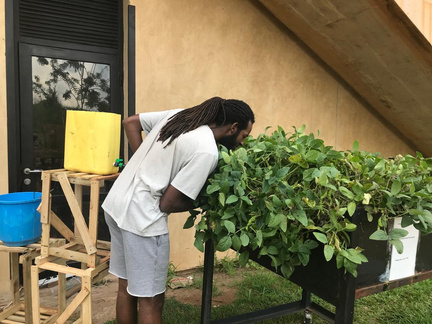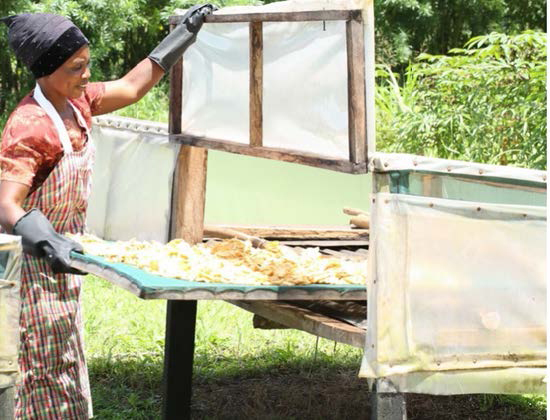Feb. 17, 2025
The problem solvers of tomorrow are transforming waste into value in Ferris State University’s international Wege Prize design competition

Take. Make. Dispose. That’s long been the extractive, linear mindset powering the world’s economies. But what if our prosperity wasn’t tied to the relentless consumption of finite resources?
It's a powerful question that lies at the heart of Wege Prize, an international student design competition organized by Ferris State University’s Kendall College of Art and Design that has been inspiring college/university students from across the globe to rethink the way we produce and consume since 2013.
Wege Prize challenges collaborative student teams to develop game-changing solutions to real-world problems through the framework of the circular economy, a model that redefines economic growth by focusing on positive society-wide benefits. The circular economy hinges on three core principles: designing out waste and pollution, keeping products and materials in use, and regenerating natural solutions.
Each year, teams compete for a share of $65,000 in prize money through an immersive nine-month process in which they evolve an initial research plan into a product, service, system, or other solution to a problem of their choosing that aligns with the principles of the circular economy. They’re mentored along the way by a diverse judging panel of industry professionals who channel their expertise into helping ideas change and grow for the better.
Participating teams are also required to represent different majors and academic institutions, embracing the reality that complex systemic challenges like food insecurity, environmental degradation, and climate change cannot be solved by a single field of knowledge working in isolation.
Over its 11-year history, Wege Prize has engaged 1,305 students representing 68 countries and over 350 unique academic disciplines in 417 academic institutions ranging from boutique schools to some of the world’s largest and most prestigious universities. Past winners have launched an equitable eco-tourism platform for indigenous communities in Mexico, turned one of the planet’s most formidable invasive species into a biodegradable alternative to petroleum-based plastic, and cracked the code on vegan leather with a versatile biodegradable material made from banana crop waste, among many other innovations.
"Now more than ever, we need creative and forward-thinking leaders who can work across boundaries to help us realize our potential for collective growth,” said Gayle DeBruyn, KCAD professor and educational lead on the Wege Prize organizing team. “Wege Prize empowers the next generation to experience and exemplify what the future of problem looks like while providing support and resources for their bold ideas to become reality.”
Now in its 12th year, Wege Prize has announced the 15 semifinalist teams in the 2025 competition that have emerged from an initial field of 90. Representing 26 academic institutions in the US and around the globe, these teams are developing compelling solutions around the creation of alternative protein sources, regenerative agriculture products, and other concepts that transform waste and inefficient production methods into environmentally sound products and services.
WHAT ARE THEY WORKING ON?
- Agpress, with team members studying in the United States, Costa Rica, and Tanzania, is integrating mealworm farming with maize flour production to create protein-enriched flour to abate malnutrition, including repurposing agricultural waste into compost.
-
AquaCycle, with team members studying in Rwanda, is creating a sustainable fish farming system from agricultural waste, including using fishpond wastewater enriched with nutrients to fertilize crops

AquaCycle team members are studying in Rwanda to create a sustainable fish farming system from agricultural waste, including using fishpond wastewater enriched with nutrients to fertilize crops.
- Aquafert Solutions, with team members studying in India and Tanzania, is leveraging fishery wastewater as a nutrient-rich fertilizer for cultivation.
- Backyard Acres, with team members studying in Nigeria, is creating a recirculation system that simplifies poultry waste management and the production of alternative protein using black soldier fly larvae to ease food insecurity.
- Dry Fresh Solution, with team members studying in Rwanda, is developing a solar-powered dehydrator that extends the shelf life of fruit and vegetables by removing moisture through indirect heating, reducing post-harvest losses.
- Eco Nasi, with team members studying in Kenya, is developing a novel technology that converts pineapple pulp waste into a premium high performance leather alternative that is five times more durable than conventional leather.
-
EcoBriquettes Solutions, with team members studying in Rwanda, is transforming agricultural waste into eco-friendly charcoal briquettes, providing a sustainable alternative to traditional fuels.

EcoValue Creators has team members studying in Rwanda to develop a pineapple snack processing solution using advanced dehydration technology to address post-harvest losses.
- EcoValue Creators, with team members studying in Rwanda, is developing a pineapple snack processing solution using advanced dehydration technology to address post-harvest losses.
- EcoWise, with team members studying in Rwanda, is creating a closed-loop system to reduce malnutrition by raising poultry and cultivating crops, including transforming filtered graywater for irrigation and organic waste into crop fertilizer.
- Envirovex, with team members studying in England, Spain, and the United States, is implementing bio-based wastewater treatment technologies to take on sources of antibiotic release from agriculture, livestock, pharmaceutical, and wastewater discharge.
- FarmGuard Innovators, with team members studying in Rwanda, is repurposing cassava peel waste into bioplastic for use as grocery and seedling sacks, with the byproduct of the starch refined into nutrient-rich animal feed.
- PREWO, with team members studying in Rwanda and Kenya, is creating wood composite materials from plastic and timber waste by combining low and high-density polyethylene plastics with sawdust or wood residue, producing durable, water-resistant composites suitable for flooring, furniture, and construction panels.
- Rethread Africa, with team members studying in Kenya, is converting sugarcane bagasse into a biodegradable alternative to traditional plastic synthetics that decomposes in natural environments.
- TerraMoist, with team members studying in Rwanda, Türkiye, and the United States, is transforming agricultural waste like banana peels, potato peels, and maize stalks into biohydrogels that help conserve soil moisture by up to 60% more than untreated soils, retaining nutrients and reducing agricultural water waste.
- VertiCrop Pioneers, with team members studying in Rwanda, is developing a vertical farming solution that leverages upcycled materials and circular economy principles to sustainably grow nutrient-rich crops like spinach, amaranth, and carrots.
WHAT ARE PREVIOUS WINNERS DOING NOW?
As the 2025 competition unfolds, recent Wege Prize winners are gaining wider recognition and additional seed funding for their initiatives, including:
- 2024 1st place winner FruiFresh, whose work in alleviating post-harvest losses by building naturally evaporative cooling facilities made from locally available materials to store produce, is making news and a real difference.
- 2023 1st place winner Banana Leather, whose start-up Banofi Leather won the $1 million Hult Prize 2023 for its sustainable leather alternative made from banana waste and whose lead member was interviewed on NBC Now.
- 2023 3rd place winner UnWastewater, who has been noticed for its innovative approach to converting carbon dioxide into organic compounds, enabling waste to be remade into valuable organic chemical feedstocks.
Thanks to the continuing financial support of The Wege Foundation, Wege Prize 2025 has opened these unique opportunities for undergraduate, graduate, and post-graduate students around the world and has helped advance the ideas and solutions behind the circular economy.
More details about Wege Prize 2025 will be revealed in the coming weeks at wegeprize.org.

